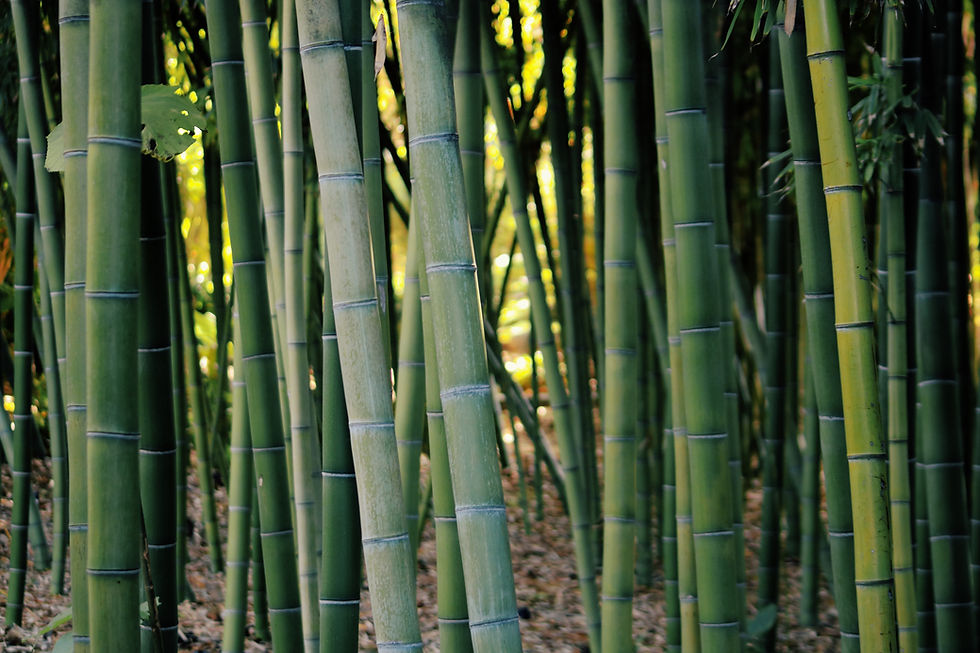What are the benefits of bamboo plants?
- bamboo bioproducts

- Nov 1, 2022
- 3 min read
Updated: Mar 28, 2024
Bamboo is a popular resource due to its valuable characteristics, especially its versatility. It can be utilised for different purposes, including construction material, tissue and hygiene products, as well as other everyday eco-friendly commodities like clothes and straws. Bamboo has also been named a vital resource for resolving global environmental problems.
Read on as bamboo bioproducts detail some of the key elements that make utilising bamboo a beneficial means for a variety of products and initiatives.
What is bamboo?
Bamboo is categorised as grass– and it’s also the fastest growing plant on the planet. Because bamboo is so diverse, different types are used for many different purposes, from tissue to construction and roofing.
Benefits of bamboo
Bamboo has many uses and benefits and has been utilised throughout history in a variety of ways. Some benefits include bamboo's role in the balance of oxygen and carbon dioxide in the atmosphere and the use of this plant to produce greener products like clothes, furniture and paper. Furthermore, bamboo can be used as an energy source and, in some cultures, as medicine. Below, we’ll explore a few of these using cases from modern-day agriculture, construction, and farming.
Is bamboo good for the environment?
In short, yes! Our research demonstrates that our bamboo farms can capture up to 275 tonnes of carbon dioxide/hectare pa and produce more oxygen than trees due to its rapid growth and capacity to generate biomass faster. Bamboo also boasts soil-regenerating abilities, and has been used for land restoration projects due to its resilience and regenerative properties. Bamboo has root systems made of rhizomes that function as anchors, binding soil together and subsequently reducing erosion. These robust root systems also enable bamboo to regrow after being damaged, harvested, or even burned down. Additionally, bamboo biochar has been used in mine-polluted soil to successfully reduce heavy metal concentrations and support the growth of new vegetation.
Related article: How can bamboo contribute to UN Sustainable Development Goal 13?
What can be made from bamboo?
Due to its tensile strength and flexibility, many products can be made from bamboo. The most popular include tissue and hygiene products, fabric and furniture.
Tissue and hygiene products
Bamboo’s properties make it an excellent pulp for tissue, toilet paper, diapers and wipes. Bamboo fibres are naturally anti-bacterial and can be safely processed. So, hygiene products containing bamboo are ideal for sensitive skin as they are super soft and hypoallergenic.
Fabric
There are many textiles made from bamboo such as bamboo viscose, mechanically produced fine bamboo fibre, and lyocell type. Bamboo fabric is soft, durable, highly breathable, and highly elastic. It is commonly used in sheets, blankets, towels, and underwear. Viscose and semi-synthetic bamboo fabrics are less expensive than cotton, and genuine bamboo fibre can be produced using eco-friendly methods. Some bamboo fabrics are certified by the USDA as organic, environmentally sustainable, and economically ethical.
Furniture
Bamboo furniture is durable, versatile, easy to maintain, and effortless to clean. These characteristics are key reasons why bamboo is used as a replacement for hardwood and plastic to build high-quality furniture. While wood can be affected by water, and plastic by high temperatures, bamboo remains intact in all weather conditions.
How can bamboo positively impact communities?
IFAD states that bamboo has the potential to reduce rural poverty. In communities where bamboo is planted, it has already increased the availability of jobs and created opportunities to empower women. This is an indirect result of bamboo’s viability to be processed into many different products that can be sold by local communities. INBAR stated that the production of bamboo engages a growth of around 60 billion USD each year, and local communities can benefit from that growth, too.
Can bamboo be used to produce clean energy?
Bamboo can be used as a relatively clean source of energy. Some countries use its biomass to generate electricity or as an alternative to timber charcoal. Bamboo is also used to produce fuels like ethanol in Japan, China, and Taiwan, with a smaller environmental footprint than fossil fuels. High energy demand is a reality, and concerns about environmental problems are increasing too. Using bamboo biomass to produce energy can be a potentially cleaner, global alternative in the future.
Want to learn more about bamboo plants and their benefits? Check our news and blogs here.





Comments